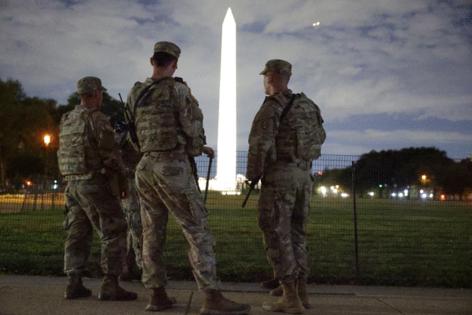Commentary: Local control over police is a check on executive power
Published in Op Eds
The president’s decision to take over the District of Columbia police, along with expanding immigration and policing enforcement in blue cities such as Chicago, undermines a constitutional framework designed to check the executive branch.
While not technically illegal, President Donald Trump’s actions are anti-democratic and speak to the desires of a strongman to control our local communities. Because the United States lacks a national police force under presidential control, moves such as federalizing local police, establishing a federal quick “ reaction force,” sending in specialized National Guard units or deploying Marines all bypass an important check on executive overreach. His promise to deputize local law enforcement to carry out federal immigration work indicates that after putting Marines on the streets of Los Angeles and now taking over D.C. police, more communities are soon to follow.
The principle of local policing is a constitutionally grounded barrier to potential abuses of executive power. Under the 10th Amendment, powers not delegated to the federal government are reserved for the states and, by extension, their cities and towns. As a result, the federal government cannot legally commandeer local police to enforce federal immigration laws. With more than 18,000 decentralized police departments governed locally, the system creates a resilient federalist check against executive overreach. While D.C. is a notable exception to this system, there are still several legal constraints on executive powers that highlight the abnormality of Trump’s move. This deepens the president’s challenge to federalist constraints and the idea that the president cannot direct the operations of local police without the consent of local leaders.
This federalist structure, though imperfect, makes it exceedingly difficult for any president to mobilize a unified armed police force against domestic targets. Many global examples show the wisdom of a political system that checks the executive power by placing policing under local control. In Guatemala, for example, the national police were used to root out and destroy civil society groups. Turkish National Police, under increasingly authoritarian control, have been used to settle political scores. Even in the U.S., a relatively small and under-resourced FBI has spied on political dissidents at the direction of the executive. Now, imagine this power put into every American town. We’re certainly seeing it on display in our nation’s capital and soon other cities as a result of a new executive order expanding the military’s role in domestic policing.
While some states and municipalities voluntarily participate and incentivize U.S. Immigration and Customs Enforcement cooperative 287(g) agreements, many others have drawn boundaries. During the protests in 2020, Oakland and San Diego in California put legal constraints on how their law enforcement would comply with questionable federal actions, such as masked federal agents kidnapping people off city streets. More recently, the Los Angeles school district rebuffed federal agents trying to enter a school without a warrant, Denver sued the government to stop warrantless ICE actions on school property, and San Mateo County, California, is considering providing immigration attorneys to residents.
To be clear: There isn’t a “sanctuary” city in America that can legally prevent ICE from doing its job, and local jurisdictions must investigate criminal actions. But cities are under no constitutional obligation to coordinate with ICE any more than they are required to preemptively coordinate with the Transportation Security Administration. Imagine telling local cops that they are supposed to check all luggage for 3.5 ounces of liquids because of a TSA regulation instead of patrolling their beat. This is the logical conclusion of ignoring local policing and the precedent courts have established.
Of course, local policing has significant drawbacks too. The decentralized nature of policing makes it notoriously difficult to enforce national standards and accountability and promote civil rights. Federal courts are forced to deal with problematic departments using a system called “ consent decrees.” Historically, local control has been one way that Jim Crow and other forms of racialized policing were so successful. But limiting executive overreach is not the same as weakening federal accountability mechanisms to ensure local police respect constitutional rights. Limiting arbitrary executive police power and ensuring compliance with civil rights rules (in some cases an expansion of federal power) do not, in fact, pull in different directions — both are about prioritizing constitutional civil and political rights and due process.
But does nonenforcement of ICE policy result in less safe cities? Data indicates that cities with inclusive and trust-based policing policies report lower poverty, crime and unemployment rates than those that preemptively enforce immigration regulations. These statistics suggest that public safety is still top of mind for local police chiefs and mayors of cities not interested in pursuing Trump policies. This is even true of Washington, D.C., where crime rates have declined year over year.
The core constitutional debate going forward is whether or not it is wise to allow a president, without the request or need of local authorities (or Congress in the case of D.C.), to federalize law enforcement resources. For similar cases, the question is about the balance between legal executive authority and the 10th Amendment’s presumption of local control over policing.
Looking around the world at cases of democratic backsliding, evidence indicates that a barrier between the executive and control of local law enforcement is a critical safeguard for democracy.
____
Joel Day, Ph.D., is managing director of the University of Notre Dame Democracy Initiative. Ernesto Verdeja, Ph.D., is associate professor of peace studies and global politics at the University of Notre Dame.
___
©2025 Chicago Tribune. Visit at chicagotribune.com. Distributed by Tribune Content Agency, LLC.
























































Comments